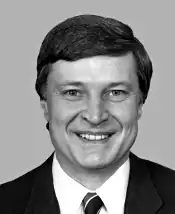| |||||||||||||||||||||||||||||||||||||||||
| |||||||||||||||||||||||||||||||||||||||||
  Landrieu: 20–30% 50–60% 60–70% 70–80% Jenkins: 20–30% 30–40% 40–50% 50–60% 60–70% Ieyoub: 20–30% 30–40% Duke: 10—20% 20–30% Hayes: 20–30% | |||||||||||||||||||||||||||||||||||||||||
| |||||||||||||||||||||||||||||||||||||||||
| Elections in Louisiana |
|---|
 |
|
|
The 1996 Louisiana United States Senate election was held on November 5, 1996, to select a new U.S. Senator from the state of Louisiana to replace the retiring John Bennett Johnston, Jr. of Shreveport. After the jungle primary election, state treasurer Mary Landrieu entered into a runoff election with State Representative Woody Jenkins of Baton Rouge, a former Democrat who had turned Republican two years earlier.
Landrieu prevailed by 5,788 votes out of 1.7 million cast, a margin of 0.34 percentage points, making the election the closest race of the 1996 Senate election cycle and one of the closest elections in Louisiana history. Mary Landrieu was the first woman elected to the United States Senate from Louisiana since Rose Long in 1936 and the first woman elected to a full term to the United States Senate from Louisiana. In the concurrent presidential election, Democrat Bill Clinton carried Louisiana by a considerable margin of 927,837 votes to 712,586 cast for Republican Bob Dole.
Jungle primary
The multi-candidate field for the primary included Democratic state Attorney General Richard Ieyoub and David Duke, the former Grand Wizard of the Ku Klux Klan, running again as a Republican. Among the minor candidates was Peggy Wilson, an at-large member of the New Orleans City Council, and Troyce Guice, who had sought the same seat thirty years earlier when it was held by the veteran Senator Allen J. Ellender.
| Party | Candidate | Votes | % | |
|---|---|---|---|---|
| Republican | Woody Jenkins | 322,244 | 26.23% | |
| Democratic | Mary Landrieu | 264,268 | 21.51% | |
| Democratic | Richard Ieyoub | 250,682 | 20.41% | |
| Republican | David Duke | 141,489 | 11.52% | |
| Republican | Jimmy Hayes | 71,699 | 5.84% | |
| Republican | Bill Linder | 58,243 | 4.74% | |
| Republican | Chuck McMains | 45,164 | 3.68% | |
| Republican | Peggy Wilson | 31,877 | 2.59% | |
| Democratic | Troyce Guice | 15,277 | 1.24% | |
| Independent | Nicholas J. Accardo | 10,035 | 0.82% | |
| Independent | Arthur D. "Jim" Nichols | 7,894 | 0.64% | |
| Democratic | Sadie Roberts-Joseph | 4,660 | 0.38% | |
| Independent | Tom Kirk | 1,987 | 0.16% | |
| Independent | Darryl Paul Ward | 1,770 | 0.14% | |
| Independent | Sam Houston Melton, Jr. | 1,270 | 0.1% | |
| Turnout | 1,228,559 | 100% | ||
Runoff election
Certified Results After Recount
| Party | Candidate | Votes | % | ±% | |
|---|---|---|---|---|---|
| Democratic | Mary Landrieu | 852,945 | 50.17% | -3.78% | |
| Republican | Woody Jenkins | 847,157 | 49.83% | +6.35% | |
| Majority | 5,788 | 0.34% | -10.13% | ||
| Turnout | 1,700,102 | 100% | |||
| Democratic hold | |||||
Allegations of election fraud
Landrieu carried the Democratic stronghold of New Orleans by about 100,000 votes; in the days after the runoff election, Jenkins's campaign manager Tony Perkins alleged voting irregularities there.[2]
Jenkins refused to concede and claimed to have received many complaints about election fraud in New Orleans for incidents such as vote hauling and participation by unregistered voters.[2] In April 1997, Jenkins appeared before the Republican-controlled U.S. Senate and petitioned for Landrieu's unseating pending a new election.[3][4] In a party-line 8–7 vote, the Senate Rules Committee agreed to investigate the charges.[5]
Only a month into the probe, however, it emerged that Thomas "Papa Bear" Miller, a detective hired by Jenkins to investigate claims of fraud, had coached witnesses to claim they had participated in election fraud. Three witnesses claimed Miller had paid them to claim that they had either cast multiple votes for Landrieu or drove vans of illegal voters across town. The others told such bizarre tales that FBI agents dismissed their claims out of hand. It also emerged that Miller had several felony convictions on his record, including a guilty plea to attempted murder. The Democrats walked out of the probe in protest, but the probe continued.[6]
The investigation dragged on for over ten months, angering the Democrats and exacerbating partisan friction in the day-to-day sessions of the Senate Agriculture, Nutrition and Forestry Committee to which Landrieu was assigned as a freshman member of the 105th Congress. Finally, in October 1997, the Rules Committee concluded that while there were major electoral irregularities, none of them were serious enough to burden Louisiana with a new election at that stage. It recommended that the results stand.
The Landrieu-Jenkins contest was not the only U.S. Senate election in 20th century Louisiana in which the results were hotly disputed. In 1918, future Senator John H. Overton claimed the renomination and hence reelection of Senator Joseph E. Ransdell was tainted by fraud. In 1932, Senator Edwin S. Broussard claimed that his primary defeat by Overton was fraudulent. In both cases, the Senate seated the certified winners, Ransdell and Overton, respectively.
See also
Notes
References
- 1 2 "1996 U.S. Senate Results: Louisiana". Federal Election Commission. Retrieved May 3, 2020.
- 1 2 Shuler, Marsha (November 9, 1996). "Landrieu victory certified; Jenkins continues to hint at challenge on N.O. vote". The Advocate. Baton Rouge. Archived from the original on July 6, 1997. Retrieved May 3, 2020.
- ↑ McKinney, Joan (April 11, 1997). "Jenkins gets support". The Advocate. Baton Rouge. Archived from the original on July 6, 1997. Retrieved May 3, 2020.
- ↑ McKinney, Joan (April 9, 1997). "Panel advised to limit probe of La. election". The Advocate. Baton Rouge. Archived from the original on July 6, 1997. Retrieved May 3, 2020.
- ↑ Shuler, Marsha (April 18, 1997). "Panel votes for full probe". The Advocate. Baton Rouge. Archived from the original on July 6, 1997. Retrieved May 3, 2020.
- ↑ Carney, James (July 7, 1997). "No Saints in New Orleans". Time. Vol. 150, no. 1. Archived from the original on February 9, 1999. Retrieved May 3, 2020.
External links
- November 5, 1996 runoff results from Louisiana Secretary of State
- Archive of stories from November 9, 1996, to June 28, 1997, about election dispute from The Advocate of Baton Rouge
.jpg.webp)
.jpg.webp)


